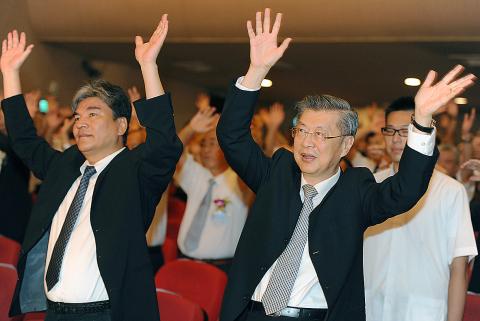The credibility of President Ma Ying-jeou (馬英九) has dropped back to a key low point, while Minister of the Interior Lee Hong-yuan (李鴻源) ranked first in a survey of public opinion on Cabinet members. The survey indicated generally poor approval ratings for the entire government.
Ma’s latest credibility rating of 28.2 percent was the same as in early July and was the lowest on record since he took office in 2008, with 55.8 percent of respondents saying they did not trust him, according to the survey released by Taiwan Indicator Survey Research (TISR) yesterday.
The poll also found that Ma’s approval ratings remained low at 21.3 percent, with 69.6 percent of those polled saying they were not satisfied with Ma’s governance.

Photo: Liao Chen-hui, Taipei Times
The Cabinet, led by Premier Sean Chen (陳冲), frequently described as an “economic Cabinet,” did not fare well in the survey which sought to gauge opinions on 12 Cabinet members.
Lee, an expert on hydraulic engineering, managed to outperform his colleagues, receiving an approval rating of 31.6 percent, compared with an 18.2 percent disapproval rate. Lee was the only one who enjoyed a higher approval rating than disapproval rating.
He was followed by Minister of Transportation and Communication Mao Chi-kuo (毛治國) who had an approval rating of 23.2 percent, Council of Labor Affairs Minister Jennifer Wang (王如玄) at 18.1 percent and Mainland Affairs Council Minister Lai Shin-yuan (賴幸媛) at 15.5 percent.
Council of Agriculture Minister Chen Bao-ji (陳保基) was the least popular Cabinet member, with an approval rating of just 7.1 percent, while Council for Economic Planning and Development Minister Yiin Chii-ming (尹啟銘) ranked second from bottom with 7.5 percent.
Minister of Economic Affairs Shih Yen-hsiang (施顏祥) had the highest disapproval rating among the Cabinet at 42.2 percent.
The number of approval and disapproval ratings were low because more than 40 percent of respondents said they “had no impression whatsoever” on the 12 ministers’ performance.

A preclearance service to facilitate entry for people traveling to select airports in Japan would be available from Thursday next week to Feb. 25 at Taiwan Taoyuan International Airport, Taoyuan International Airport Corp (TIAC) said on Tuesday. The service was first made available to Taiwanese travelers throughout the winter vacation of 2024 and during the Lunar New Year holiday. In addition to flights to the Japanese cities of Hakodate, Asahikawa, Akita, Sendai, Niigata, Okayama, Takamatsu, Kumamoto and Kagoshima, the service would be available to travelers to Kobe and Oita. The service can be accessed by passengers of 15 flight routes operated by

Chinese spouse and influencer Guan Guan’s (關關) residency permit has been revoked for repeatedly posting pro-China videos that threaten national security, the National Immigration Agency confirmed today. Guan Guan has said many controversial statements in her videos posted to Douyin (抖音), including “the red flag will soon be painted all over Taiwan” and “Taiwan is an inseparable part of China,” and expressing hope for expedited reunification. The agency last year received multiple reports alleging that Guan Guan had advocated for armed reunification. After verifying the reports, the agency last month issued a notice requiring her to appear and explain her actions. Guan

GIVE AND TAKE: Blood demand continues to rise each year, while fewer young donors are available due to the nation’s falling birthrate, a doctor said Blood donors can redeem points earned from donations to obtain limited edition Formosan black bear travel mugs, the Kaohsiung Blood Center said yesterday, as it announced a goal of stocking 20,000 units of blood prior to the Lunar New Year. The last month of the lunar year is National Blood Donation Month, when local centers seek to stockpile blood for use during the Lunar New Year holiday. The blood demand in southern Taiwan — including Tainan and Kaohsiung, as well as Chiayi, Pingtung, Penghu and Taitung counties — is about 2,000 units per day, the center said. The donation campaign aims to boost

The Central Weather Administration (CWA) said a magnitude 4.9 earthquake that struck off the coast of eastern Taiwan yesterday was an independent event and part of a stress-adjustment process. The earthquake occurred at 4:47pm, with its epicenter at sea about 45.4km south of Yilan County Hall at a depth of 5.9km, the CWA said. The quake's intensity, which gauges the actual effects of a temblor, was highest in several townships in Yilan and neighboring Hualien County, where it measured 4 on Taiwan's seven-tier intensity scale, the CWA said. Lin Po-yu (林柏佑), a division chief at the CWA's Seismological Center, told a news conference